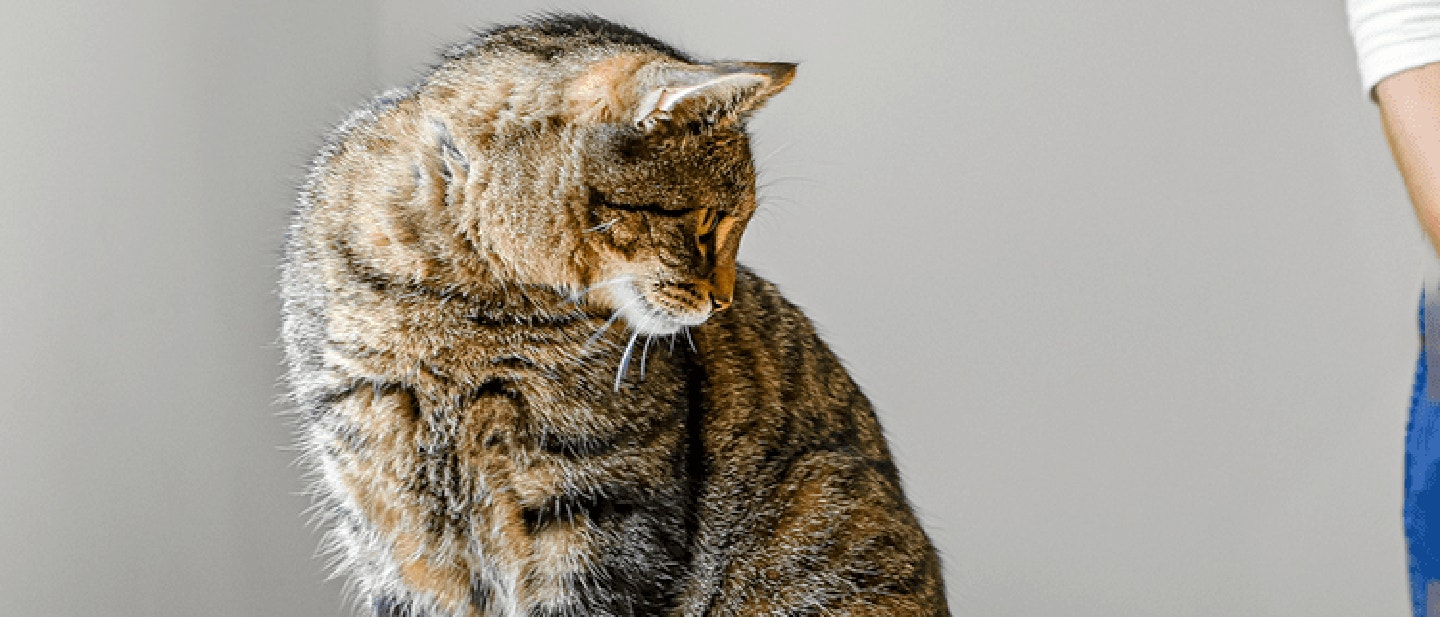
WHY IS MY CAT NOT EATING? REASONS WHY AND WHAT YOU CAN DO

Article checked by a vet
When your food-loving kitty starts refusing food, you might begin to wonder ‘why is my cat not eating?’ There are many possible reasons why your cat has lost its appetite, ranging from medical to psychological to environmental. It’s essential to figure out the cause as your cat not eating can make them very sick, very quickly. If your cat has not eaten in over 24 hours, or there are any other behavioural changes or symptoms, you should take them to the vet immediately.
In this article, we discuss possible reasons why your cat is not eating, and provide guidance on what you can do to help your feline friend.
Why Is My Cat Not Eating?
Cats are notoriously picky eaters. If you offer food different to what they’re used to, even if it’s just a different shape or texture, you might find them turning their nose away. You may even notice your cat licks food but doesn’t eat it.
However, a cat’s lost appetite could be a sign of a serious underlying illness. That’s why it’s essential to find out why your cat is not eating.
Medical Causes
Usually if your cat is not eating, it is due to a medical cause. It could be as minor as a mild stomach upset from something they’ve eaten or a reaction to a recent vaccination, or it could be a medical illness. If your cat has any other signs or symptoms alongside loss of appetite, then take them to the vet immediately.
We’ve listed some of the most common illnesses which may be why your cat is not eating.
Kidney Disease
Unfortunately, kidney disease is quite common among older cats. When their kidneys aren’t functioning properly, their body is unable to remove waste from the body. This creates a build up of toxins and causes extreme nausea, which could be why your cat is not eating. Another sign your cat might be suffering with kidney disease is if they are drinking more water and urinating more often.
If you suspect your cat has kidney disease, it’s essential to get them diagnosed by a vet as soon as possible so you can start treatment. Your vet may recommend renal cat foods, or could also prescribe appetite stimulants.
Dental Issues
Between 50-90% of cats(open in new tab) above the age of 4 will suffer from some form of dental disease, which ranges in severity. It could be gingivitis (inflammation of their gums), tooth resorption, broken teeth, abscesses or a mouth injury, all of which may cause pain and discomfort in your cat’s mouth and therefore could be why your cat is not eating.
We advise you to take your cat to the vet if you suspect they have any dental issues, so that they can receive the necessary treatment and take medication to manage their pain. You can support your cat in the meantime by offering wet food broken into smaller pieces, as it’s softer and easier to eat than dry food.
Respiratory Problems
Most of a cat’s appetite is stimulated through their sense of smell and sight. If your cat has an upper respiratory infection, they may experience a blocked nose or watery eyes with discharge, which can affect their senses and therefore appetite.
To help your kitty, you can keep their nose clean and clear so they are able to smell their food. You could also offer more aromatic foods such as tuna or by gently warming up your cat’s wet food to enhance its smell.
Psychological Causes
If your cat is not eating and it’s not due to an illness, it’s likely that something psychological is causing your cat’s lost appetite. This could simply be due to cats being finicky eaters, or it could be more serious like anxiety or depression.
Fussy Eaters
Cats are fussy eaters and like to stick to familiar foods. If your cat is not eating, or licks food but doesn’t eat it, see whether the food you’re offering has a different shape or texture than what they’re used to. If your cat notices a new flavour, they may refuse to eat because of it.
Also, make sure not to leave wet food out for more than a few hours as it can quickly become stale, especially in hot weather. If your cat has tried to eat stale food, they may find it off-putting and inadvertently learn to avoid the food next time.
Stress
Some cats may feel stress, anxiety or depression due to new or unfamiliar situations, and therefore may be why your cat is not eating. For example, if there has been a death in the family (whether it’s a family member or another pet), cats will notice their absence and may feel depressed because of it. Similarly, if you have brought home a new pet or there's a new person around, cats may feel on edge and territorial. If there are any other changes, such as renovations in the house or a new arrangement of their resources, this can also be stressful to cats.
Stress in cats can cause constipation too, so you may consider offering wet food with a high moisture content which can help to soften stools and keep their bowels moving. Try to resolve the source of stress for your cat, or minimise the direct impact on them. Offer lots of love and affection so your cat feels safe, and reward desired behaviours with cat treats to build positive association for interactions that overcome stress. If you are not sure what is stressing your cat out, then speak to a vet to help find the root cause.
Environmental Causes
If the reason your cat is not eating is not medical or psychological, then you can look to other environmental causes.
A Change In Diet
Cats are creatures of habit. Unlike humans, they are quite happy to eat the same food everyday and don’t require much variety. If you’ve recently changed your cat’s food then this could be the reason your cat is not eating. Changing your cat’s diet suddenly can also make their stomach upset, as their digestive system needs time to adjust.
We advise that you gradually change your cat’s food by introducing the new food over a period of time. You can do this by offering new food alongside familiar food - not mixed, as this would put your cat off their entire meal. You can then slowly increase the ratio of new to old food, until your cat is ready for the change. Learn more about switching cat food effectively.
Seasonal Changes
If your cat is refusing food during summer, then the season could be the culprit. Generally, cats eat approximately 15% less less in warmer months. This is because they require less energy to maintain their body temperature compared to winter, so they don’t need to eat as much food. Another possible reason why your cat is not eating in summer could be because they are mostly outside enjoying the weather, and may be seeking food from neighbours or even catching their own meals.
You can help your cat by making sure they are drinking enough water to keep them hydrated. Cats naturally prefer to graze on food throughout the day, returning to their food bowls 7-9 times a day to enjoy smaller meals, rather than large portions in one sitting. Make sure to remove leftovers and clean their bowl thoroughly, as food goes off more quickly in summer and can attract insects too. We discuss more about feeding cats in the summer here.
What To Do If Your Cat Is Not Eating?
If your cat is not eating, it’s important that you monitor their behaviour closely and look out for any other signs or symptoms. You should also make sure they are drinking water even if they’re not eating.
If it’s been more than 24 hours since your cat’s last meal, then you should take them to the vet immediately. Further delay may cause your cat to become seriously unwell. Your vet can then determine what is causing your cat to not eat, and recommend the best treatment for their specific needs.
How Can You Get Your Cat To Eat?
If your cat has lost their appetite, it’s essential you take them to the vet to rule out any medical illnesses first. If the reason is not medical, then you may be wondering what to feed a cat that won’t eat. There are things you can do at home to stimulate your cat’s appetite, including making mealtimes more exciting using our tips.
Keep Food Bowls Clean
If your cat’s bowl is not clean or has leftover food that’s gone stale, your cat will likely not touch it for that reason - causing them to avoid it in the future too. Keep your cat’s bowl clean by washing it after each meal, and throw away any leftover food after mealtime.
Mix In Other Tasty Ingredients
It’s tricky to figure out what to feed a cat that won’t eat. You can pour juice from a tuna can (packed in spring water only), feline-friendly gravy or fish oil onto their food to make it more enticing. This is only a temporary measure to get your cat eating again - you can look at the benefits of mixed feeding to keep your cat’s appetite stimulated.
Keep To A Consistent Feeding Routine
Cats thrive best with routine. If you regularly feed your cat at the same time each day, they will become accustomed to expecting food at that time - which will help stimulate their appetite.
Feed Them Somewhere Safe and Quiet
If you have multiple cats or any other pets, make sure your cat has a separate food area so they can enjoy their meal in their own privacy.
Warm Food
Check your cat’s nose is clean, and then gently warm their wet food in a microwave bowl to help bring out its aromas. If your cat can smell their food, this will stimulate their appetite and they are more likely to eat it.
We know it’s worrying when your cat stops eating their food. It’s essential you take them to the vet to make sure there’s nothing more serious going on. Try the above measures to get your cat interested in their food again, and make sure they stay hydrated. If you’re looking for more information on your cat’s feeding routine, check out our article to understand how much you should feed your cat.
